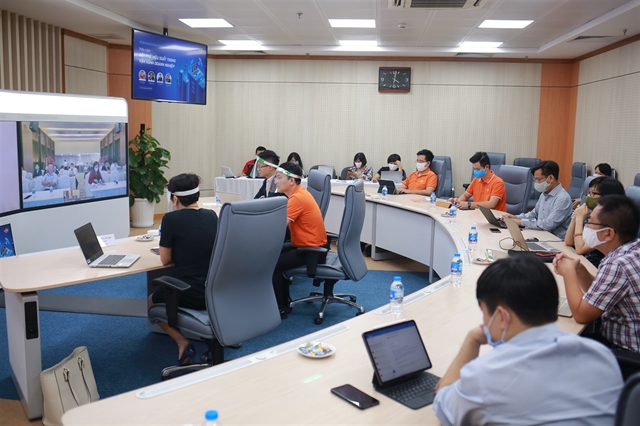Although Viet Nam is placing great emphasis on the technology sector, the growth of technology stocks on the stock market is still modest compared to their potential.

Although Viet Nam is placing great emphasis on the technology sector, the growth of technology stocks on the stock market is still modest compared to their potential.
Prices of Viet Nam’s giant FPT Corporation (FPT) fluctuate in a narrow range and have not exceeded three-digit numbers so far, although the company recorded strong increases in business results over the quarters.
FPT, the largest software company in Viet Nam, achieved revenue of VND28.21 trillion (US$1.24 billion) in the first 10 months of 2021, up 19.4 per cent, and profit after tax of VND4.3 trillion, up 20 per cent over the same period in 2020.
Revenue from new contracts in the technology segment reached VND19.5 trillion, up 27 per cent.
At the current price, a share's price/earnings (P/E) ratio is approximately 23 times, much lower than the P/E of technology corporations around the world.
Contrary to FPT, CMG shares of The CMC Corporation, the second-largest Information and Communications (ICT) group in Viet Nam, are traded at quite high prices. At the end of November this year, CMG was priced at VND62,500 per share, P/E was up to nearly 40 times. However, the liquidity of these stocks is very low, at less than 100,000 units per session.
CMG's share price has increased sharply, nearly doubling compared to the beginning of 2021. Many large shareholders wanted to sell out, such as Agribank which registered to sell more than 3 million shares.
In terms of operations, after partnering with strategic shareholder Samsung SDS, CMC Group has not made any breakthroughs to show that the partnership has begun to bear fruit. The two sides need time to resolve the challenges in cultural differences and working methods.
Apart from the two giants above, there are other small-cap technology enterprises in the market such as Joint Stock Company For Telecom & Informatics (ICT), Electronics Communications Technology Investment Development Corporation (ELC), Innovative Technology Development Corporation (ITD) and Information and Networking Technology JSC (CMT).
These enterprises have charter capital from VND100 billion to VND500 billion, with stock prices fluctuating around 2x. There are stocks with P/E of just around 5 times, which is relatively low in the valuation of stocks in the technology industry.
Some newbies in the technology sector have used the “tech label” to tell their compelling stories, pushing the stock prices upwards.
Simco Song Da Joint Stock Company (SDA) reported shares increasing 14 times in three months from VND4,485 per share to VND75,000 per share.
The sharp rise was attributed to the company’s promotion of artificial intelligence applications in the COVID-19 tracing product, and a series of other technology solutions. However, with poor business results, SDA stock then flipped and fell to the floor prices for many sessions.
Another technology company, Sai Gon Telecommunication & Technologies Corporation (SGT), was known for technology but has shifted to the real estate segment. Thanks to some industrial park projects, the market prices of SGT have risen from VND7,000 per share to over VND30,000 per share.
Bright future
In the past five years, Viet Nam's information technology industry has made great progress with an average growth rate of 26.1 per cent per year, becoming one of the key economic sectors with large revenue contribution to the State budget.
A number of small-scale technology businesses are starting to transform and actively seeking out new business activities.
Joint Stock Company For Telecom & Informatics (ICT) earns some VND2 trillion in revenue and VND75 billion in after-tax profit each year. It has also become the operator and provider of a phone-based lottery sales system for Viet Nam Lottery Company (Vietlott) with sales via mobile apps reaching more than VND1 trillion per year.
Mobile Money and 5G telecommunications networks are now the two important trends that positively affect the long-term prospects of telecommunications businesses. Information technology businesses are expected to benefit from public investment and the Government applying digital transformation to "Make in Viet Nam" products.
The information technology package for 11 routes of the North-South expressway will have a total value of VND4 trillion, focusing on services such as intelligent traffic, operating supervision, and automatic toll collection. The businesses on the stock market that are expected to be beneficiaries are Pioneer Technology and Elcom.
Digital transformation for uninterrupted businesses in a difficult context such as the pandemic will continue to be a big trend in the future. Deloitte's survey of 2,750 private businesses found that business leaders around the world believe that the impacts of the pandemic on a large scale will not only last for the next 12 months, but for the next several years.
In this context, businesses must renovate in all aspects, with development strategies focusing on improving labour productivity and digital transformation.
About 69 per cent of businesses in the survey said that they had significantly accelerated the digital transformation process during the crisis, with the belief that digital transformation will ensure trading is uninterrupted, along with many other benefits such as improved customer experience, increased sales, enhanced manageability and reduced costs, thereby bringing higher profits. VNS





